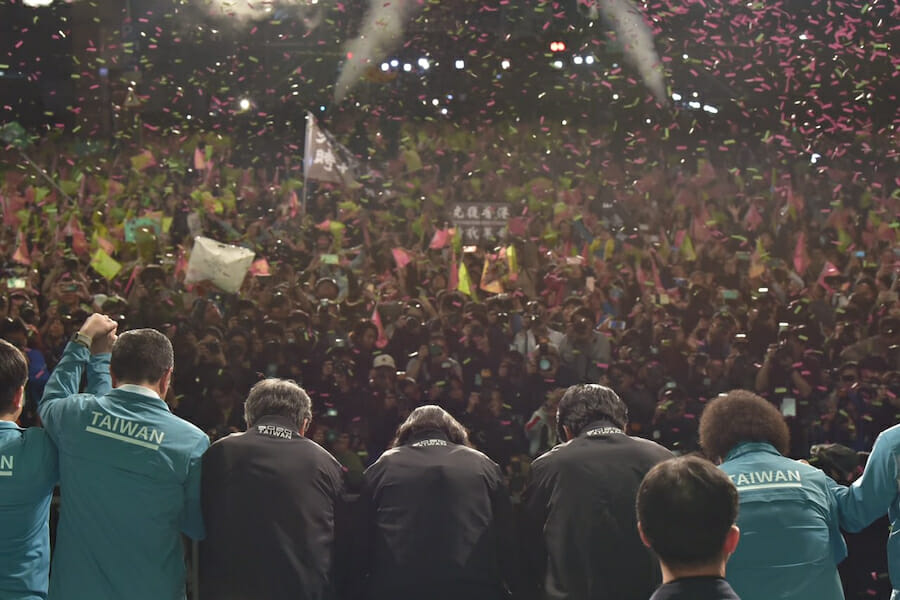
Tsai Ing-wen’s Re-election: Can Second-Chances be a Powerful Thing?
This past weekend, the people of Taiwan exercised their civic duty of going to the voting polls, and they have re-elected incumbent President Tsai Ing-wen of the Democratic Progress Party (DPP) for a second term. According to their Central Election Commission, Tsai received over 8 million votes, or 57 percent; her main opponent, Han Kuo-yu of the Kuomintang received a little over 5.5 million votes, or 38 percent; and James Soong of the People First Party received a little over 600,000 votes, or 4 percent.
I woke up on January 11th—there is a thirteen-hour difference between where I live in the U.S. and Taiwan—only to be inundated with notifications from various news media outlets and Twitter of her re-election. As I scrolled through my Twitter feed, I had realized more and more that this election was arguably one of the more consequential in Taiwan’s recent history for two reasons. First, because of the high voter turnout. Second, after her party faced heavy losses in local elections in November 2018, which prompted her to make the decision to resign as the head of her political party, Tsai made a comeback. After the DPP suffered election losses in 2018, Tsai said the following: “People believe in democratic values — today democracy taught us a lesson.” Fourteen months later, after receiving favorable results through a democratic election, it may be fair to say that she, along with her party, have learned another critical lesson: second chances are a powerful thing in life.
In her victory speech Saturday night, Tsai expressed her heartfelt gratitude to voters for re-electing the DPP. Moreover, she acknowledged that though she and Taiwan have encountered countless obstacles, she vowed to make improvements to overcome challenges that have already been met, and those that have yet to come. With regards to cross-straits relations, Tsai passionately issued a clarion call for peace. She signaled a strong message to Beijing, urging them to keep in mind “that peace, parity, democracy, and dialogue are the key to positive cross-strait interactions and long-term stable development.”
In response to Tsai’s re-election, it is no surprise that high-ranking government officials from nations that share formal diplomatic ties with Taipei have posted tweets extending their warm congratulations including Haiti, Guatemala, and the Marshall Islands, among others. In addition, foreign ministers from Japan, the United Kingdom, and the European Union have also sent their well-wishes for Tsai’s second term in office. Taiwan News published an article hinting that Lithuanian lawmaker Mantas Adomėnas has expressed support to sever diplomatic ties with China in favor of Taiwan. If this ever were to happen, Lithuania would become the first member of the European Union to cut all ties with Beijing. Realistically speaking, Adomėnas emphasized that “establishing a representative office in Taiwan would be a feasible first step.”
Congratulations to President Tsai and the people of Taiwan for another successful election. You are stronger because of your free and open society. The United States should continue strengthening our ties with Taiwan and other like-minded democracies. https://t.co/NAt6ldYpRj
— Joe Biden (@JoeBiden) January 11, 2020
Meanwhile, in the U.S., Secretary of State Mike Pompeo issued a press release, lauding both her and Taiwan “for once again demonstrating the strength of its robust democratic system, which—coupled with a free market economy and a vibrant civil society—makes it a model for the Indo-Pacific region and a force for good in the world.” Similarly, politicians from both sides of the political aisle including Senators Josh Hawley (R-MO), Rick Scott (R-FL), and former Vice President Joe Biden have expressed similar sentiments. In his tweet, Biden said that Taiwan is “stronger because of your free and open society.”
As remarkable as her resurgence may be, it was by no means free of obstacles. In September, Taipei was marred by the loss of diplomatic ties with two Pacific-island nations, Kiribati and the Solomon Islands, in favor of Beijing for what appears to be economic reasons. Additionally, the Chinese government made the decision to discontinue issuing visas for solo travelers from 47 cities to visit the de facto sovereign nation. Lastly, just a few short days before this election, several top-ranking military officials, including Taiwan Air Force General Shen Yi-Ming, were killed in a helicopter crash, prompting Tsai to suspend all campaign activities for three days.
But despite these hindrances, Tsai made two separate trips to the U.S. last year, once to New York City, and the other to Denver. In October, Ted Cruz (R-TX) became the 1st senator in 35 years to visit Taiwan during its national holiday. Lastly, the ongoing political unrest in Hong Kong seems to have elevated her popularity, as many in Taiwan are fearful that Beijing will do its utmost to erode Taiwan’s democratic way of life.
Four years ago Tsai Ing-wen became the first female president of Taiwan. This past weekend, in addition to the record-breaking turnout, she also became the first female to secure a second term as president. While her re-election has been widely associated with reflecting anti-Beijing sentiment, it is imperative that we keep the following in mind:
I know a lot of #TaiwanElection coverage depicts this election as a vote against China, but the impression I have from living here for a few weeks is that it’s actually a vote for “Taiwan” and that’s actually something different.
— Erin Hale (@erinhale) January 11, 2020
Two days before the election, Taiwan’s foreign minister, Joseph Wu, emanated this very message while speaking to reporters: “I just don’t think China should read Taiwan’s election as its own victory or defeat.”
Now that the election is behind her, Tsai can utilize this second chance to focus on advancing Taiwan’s interests both domestically and abroad by cultivating partnerships with like-minded democratic nations while bettering the economy. And with that, amidst the elevating tensions in cross-strait relations, assuming that she, along with the DPP, do not take their second chance for granted, they can continue to serve as a beacon for democratic principles and practices in the Indo-Pacific region.

